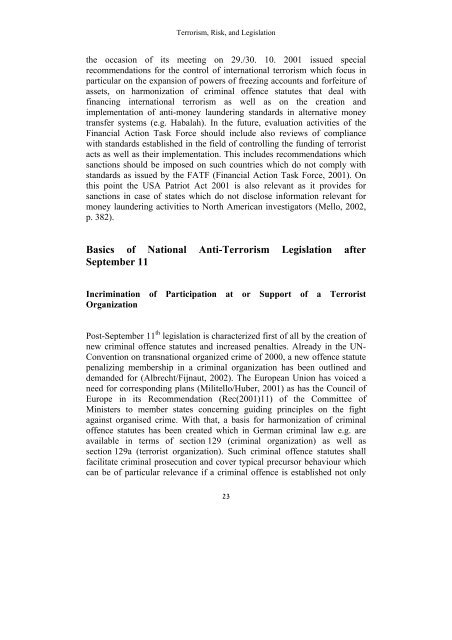222467to222472
222467to222472
222467to222472
You also want an ePaper? Increase the reach of your titles
YUMPU automatically turns print PDFs into web optimized ePapers that Google loves.
Terrorism, Risk, and Legislation<br />
the occasion of its meeting on 29./30. 10. 2001 issued special<br />
recommendations for the control of international terrorism which focus in<br />
particular on the expansion of powers of freezing accounts and forfeiture of<br />
assets, on harmonization of criminal offence statutes that deal with<br />
financing international terrorism as well as on the creation and<br />
implementation of anti-money laundering standards in alternative money<br />
transfer systems (e.g. Habalah). In the future, evaluation activities of the<br />
Financial Action Task Force should include also reviews of compliance<br />
with standards established in the field of controlling the funding of terrorist<br />
acts as well as their implementation. This includes recommendations which<br />
sanctions should be imposed on such countries which do not comply with<br />
standards as issued by the FATF (Financial Action Task Force, 2001). On<br />
this point the USA Patriot Act 2001 is also relevant as it provides for<br />
sanctions in case of states which do not disclose information relevant for<br />
money laundering activities to North American investigators (Mello, 2002,<br />
p. 382).<br />
Basics of National Anti-Terrorism Legislation after<br />
September 11<br />
Incrimination of Participation at or Support of a Terrorist<br />
Organization<br />
Post-September 11 th legislation is characterized first of all by the creation of<br />
new criminal offence statutes and increased penalties. Already in the UN-<br />
Convention on transnational organized crime of 2000, a new offence statute<br />
penalizing membership in a criminal organization has been outlined and<br />
demanded for (Albrecht/Fijnaut, 2002). The European Union has voiced a<br />
need for corresponding plans (Militello/Huber, 2001) as has the Council of<br />
Europe in its Recommendation (Rec(2001)11) of the Committee of<br />
Ministers to member states concerning guiding principles on the fight<br />
against organised crime. With that, a basis for harmonization of criminal<br />
offence statutes has been created which in German criminal law e.g. are<br />
available in terms of section 129 (criminal organization) as well as<br />
section 129a (terrorist organization). Such criminal offence statutes shall<br />
facilitate criminal prosecution and cover typical precursor behaviour which<br />
can be of particular relevance if a criminal offence is established not only<br />
23


